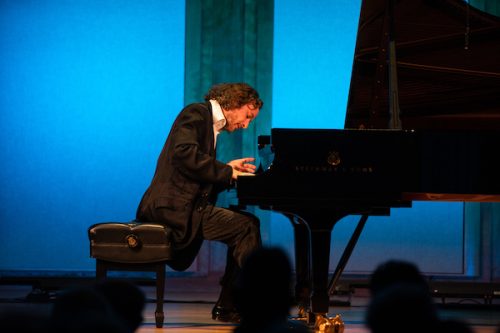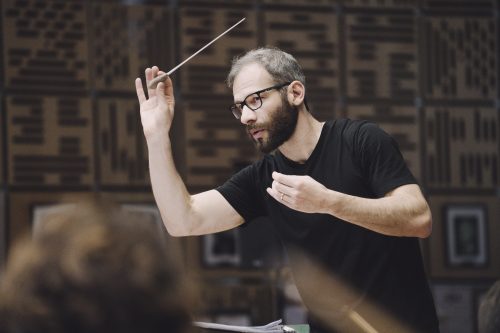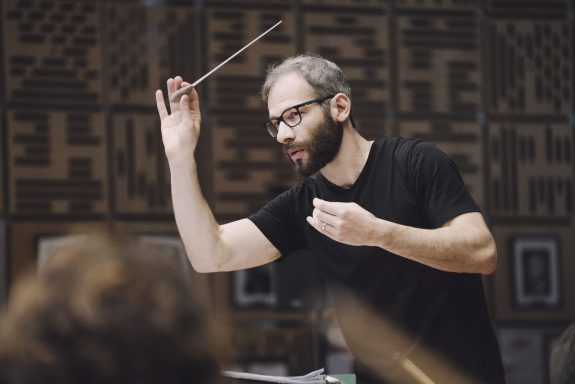 United Kingdom Prokofiev, R. Strauss, Sibelius, Debussy: Martin Helmchen (piano), London Philharmonic Orchestra / Dima Slobodeniouk (conductor). Royal Festival Hall, London, 20.3.2024. (JR)
United Kingdom Prokofiev, R. Strauss, Sibelius, Debussy: Martin Helmchen (piano), London Philharmonic Orchestra / Dima Slobodeniouk (conductor). Royal Festival Hall, London, 20.3.2024. (JR)

Prokofiev – Symphony No.1 (‘Classical’)
R Strauss – Burleske
Sibelius – The Oceanides, Op.73
Debussy – La mer
Have some pity for the unfortunate music critic who must remember to add all those fiddly little Czech accents to the names Janáček, Dvořák, Jenůfa; not confuse Buniatishvili with Batiashvili; and now learn to spell and pronounce Dima Slobodeniouk. Perhaps we will be soon calling him simply Dima (as we do with Mirga and Santtu), for – be of no doubt – we will be seeing and hearing a great deal more of Dima Slobodeniouk in future. I will come to him again, later in my review.
This was a motley patchwork of a concert, four quite short pieces, but full of interest. To warm us up, Prokofiev’s delightful First Symphony composed when Prokofiev was 25. Slobodeniouk kept the strings on their toes, was keen on heavy accents, the first movement was razor-sharp and witty. Baton down for the inner movements, the Larghetto graceful, flowing and not rushed. The Gavotte was over in the twinkling of an eye and we all enjoyed the energetic and joyous Finale. Probably given limited rehearsal time, Slobodeniouk made his greatest impression at the start and end of each movement.
Martin Helmchen was the star soloist in Richard Strauss’s Burleske, which is rather an odd piece which seems to go nowhere. Hans von Bülow thought the piano part was unplayable and Strauss himself concluded the piece was ‘utter nonsense’ and put it aside. Only some years later did it resurface, but it is still not a regular on the concert platform. It lacks a really memorable tune, unusually for Strauss, although the timpani unexpectedly announces a four-bar theme at the outset which forms the basis of the piece: it is an early work, composed when Strauss was only 21. The piano writing is indeed fiendish; Helmchen made it seem like light work, dispatched with astounding ease. His charming encore, Robert Schumann’s little heard ‘The Prophet Bird’ (from his Waldszenen) was full of tenderness, with slight pauses between the phrases, and had the audience completely spellbound.

After the interval, two musical depictions of the ocean. Slobodeniouk is Russian by birth but moved to Finland when he was seventeen, so Sibelius is in his DNA. His reading of the short tone poem The Oceanides was masterly; Slobodeniouk, his long arms swirling, painted the massive swell of the sea and the crashing waves to perfection.
Finally, to more familiar territory, Debussy’s La mer. We all revelled in Debussy’s orchestral colouring and the woodwind in particular came up trumps. The end of the opening movement (‘From dawn to noon on the sea’) was particularly impressive: as Satie wittily put it, ‘I liked the bit around a quarter to eleven best’. Slobodeniouk injected weight and urgency into the final climax and received an extremely warm reception. I have not been so impressed with a conductor, whom I did not know before – I missed his first concert with the LPO – for a very long time. He has been at the helm of the Lahti Symphony Orchestra and the Galician Symphony Orchestra, but he has relinquished both posts and he is now guesting with many of the big orchestras to great acclaim. He will soon conduct a Heldenleben with the Tonhalle Zürich and has impressed with Boris Godunov. It will not be long before a major orchestra snaps him up.
John Rhodes
